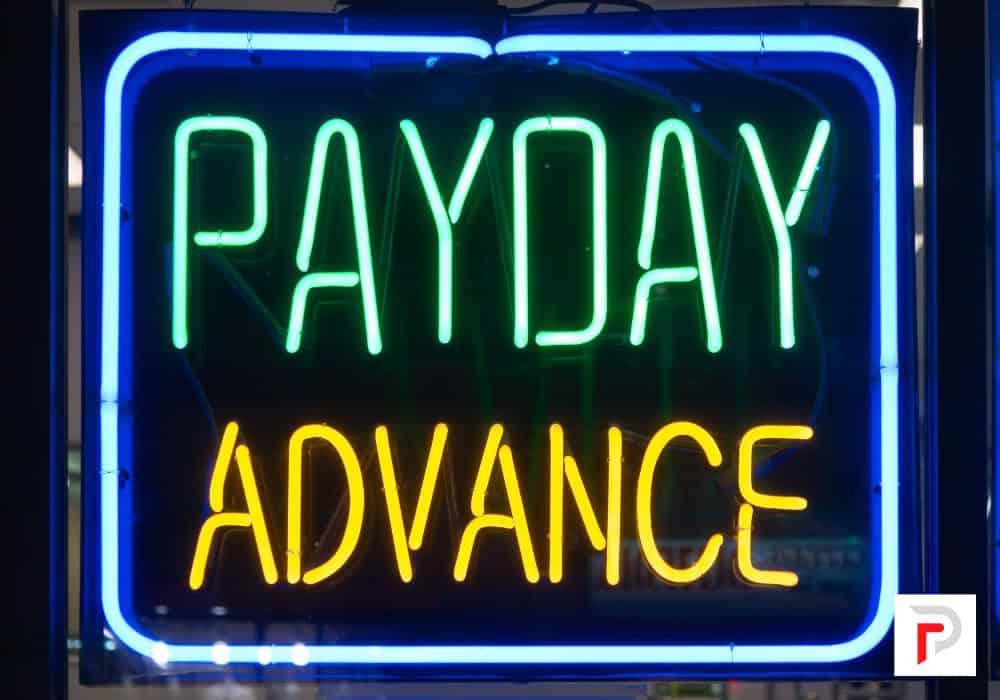So, you’ve heard about the latest financial schemes making waves in the corporate world? Or maybe you’ve driven past a payday or car title loan center featured prominently in a once-optimistic, run down strip American mall recently?
From same-day paycheck access fees to the push for debit cards over direct deposit, to high interest loans issued on the spot in cash to help someone get to their next paycheck, it’s like a financial circus is in town.
But let’s cut the theatrics. These practices aren’t just a nuisance; they’re a predatory trap that can ensnare even the most hardworking individuals. In this digital age, where convenience is king, it’s easy to get caught in the whirlwind of these calculating schemes.
The practice of offering same-day paycheck access for a fee, coupled with pressure to use debit cards, is a concerning trend that can have significant negative consequences for employees. These predatory tactics not only exploit individuals in vulnerable financial positions but also perpetuate cycles of debt and financial inequality.
They also enable and temporarily reward bad personal spending and budgeting habits, the kind that prevent people from easily saving hundreds to even thousands of dollars over a lifetime of working.
It is essential for employers, policymakers, and consumers to be aware of these practices and to advocate for fair and transparent financial services. By understanding the unethical aspects of these schemes and making informed choices, we can work towards a more equitable and just financial landscape.
How High Finance is Waging a Secret Economic War on Working People
A robust and upwardly mobile working and middle class is essential for a healthy and thriving society. This demographic forms the backbone of the economy, driving consumption, innovation, and civic engagement.
However, the increasing dominance of hedge fund-owned and backed corporations poses a significant threat to this essential social and economic foundation. These entities often prioritize short-term profits over long-term sustainability, leading to predatory practices that disproportionately affect the working and middle class.
For instance, the widespread adoption of heavily financed payment options, such as same-day paycheck access for a fee, can trap individuals in a cycle of debt, limiting their ability to save, invest, and achieve upward mobility. This stifling of the general population ultimately harms everyone, as it reduces consumer spending, dampens economic growth, and undermines social stability.
The Predatory Nature of Same-Day Paycheck Options
The practice of offering same-day paycheck access for a fee, often coupled with pressure to use a debit card rather than direct deposit, is a concerning trend in the workplace. This practice, while seemingly convenient, can have significant negative consequences for employees.
Potential Ethical and Legal Issues:
- Usury and Exploitation: If the fees charged for same-day access are excessively high, they could be considered usurious, particularly if the employee has limited options or feels pressured to accept them.
- Predatory Lending Practices: The way these fees are presented and the pressure to use a debit card can resemble predatory lending practices, targeting individuals who may be in a vulnerable financial position.
- Disproportionate Impact: These practices can disproportionately affect low-income workers who may rely on their paycheck to meet immediate financial needs.
- Erosion of Financial Independence: Encouraging the use of debit cards can lead to a cycle of dependence on the employer or the third-party payment provider, limiting the employee’s financial flexibility and control.
- Privacy Concerns: The use of debit cards can raise privacy concerns, as employees may be more vulnerable to identity theft or financial fraud.
Additional Company Case Studies and Examples:
Beyond Darden Restaurants and Murphy USA LLC, similar practices have been observed in various industries, including retail, hospitality, and healthcare. In some cases, employees have reported feeling pressured to accept these options or facing negative consequences if they refuse.
It’s important to note that while these practices may be legal, they raise serious ethical questions and can have a detrimental impact on employees’ financial well-being.
If you are experiencing or witnessing these practices in your workplace, consider contacting local labor organizations, consumer protection agencies, or legal aid services for guidance.
Payday Loan Centers Line America’s Once Pristine Middle Class Strip Malls and Streets
A payday loan center is a financial institution that offers short-term, high-interest loans. These loans are typically due on the borrower’s next payday.
Key characteristics of payday loans include:
- Small amounts: Loans are usually for a few hundred dollars or less.
- High interest rates: Payday loans come with very high interest rates, often expressed as annual percentage rates (APRs).
- Short repayment terms: The loan is due on the borrower’s next payday, usually within two weeks.
- No credit check: Payday lenders often do not require a credit check, making them accessible to individuals with poor credit.
While payday loans can provide quick access to cash, they can also lead to a cycle of debt if not repaid on time. The high interest rates and fees can make it difficult for borrowers to repay the loan, leading to additional charges and potential financial hardship.
Car Title Loans Bring Opportunism Too
Car title loan centers are another type of predatory lending institution that can have serious negative consequences for borrowers.
Here’s how they work:
- Collateral: To obtain a car title loan, a borrower must use their car title as collateral. This means that if the borrower fails to repay the loan, the lender can repossess their car.
- High interest rates: Car title loans typically have extremely high interest rates, often expressed as annual percentage rates (APRs) in the triple digits.
- Short repayment terms: The loan is due on the borrower’s next payday or within a short period.
- Risk of repossession: If the borrower cannot repay the loan, their car can be repossessed, leaving them without transportation and facing additional fees.
Car title loans can trap borrowers in a cycle of debt, as the high interest rates and fees can make it difficult to repay the loan on time. This can lead to additional charges and potential financial hardship.
If you’re considering a payday or car title loan, it’s important to explore other options first, such as:
- Budgeting: Creating a budget can help you identify areas where you can cut back on spending.
- Negotiating with creditors: You may be able to negotiate payment plans or extensions with your creditors.
- Seeking financial counseling: A financial counselor can help you develop a plan to manage your finances.
It’s generally recommended to avoid payday and car title loans due to their high costs and potential risks.
While Most Americans Already Live Paycheck to Paycheck, Bankers Eye Opportunity
A staggering number of Americans are living paycheck to paycheck. Recent studies indicate that nearly two-thirds of Americans struggle to make ends meet, relying on their next paycheck to cover basic expenses.
This financial precariousness is exacerbated by the fact that the average American has a meager emergency fund of only a few hundred dollars. When faced with unexpected expenses, such as medical bills, car repairs, or job loss, individuals may be forced to turn to risky credit and financing options, like payday loans or car title loans, simply to survive.
These predatory lending practices often come with exorbitant interest rates and fees, trapping borrowers in a cycle of debt that can be difficult to escape.
Explanations and Implications of Predatory Lending Practices
The practices of offering same-day paycheck access for a fee and encouraging the use of debit cards over direct deposit are rooted in the desire for financial gain. These strategies often target individuals who may be in a vulnerable financial position, such as low-income workers.
Explanations:
- Profit Maximization: These practices allow lenders to charge high interest rates and fees, maximizing their profits.
- Targeting Vulnerable Populations: Individuals who rely on their paycheck to meet immediate financial needs are more likely to accept these options, even if they are not in their best interest.
- Limited Options: In some cases, employees may have limited options for accessing their pay, making these predatory practices more appealing.
Implications:
- Present Generations: These practices can lead to a cycle of debt and financial hardship for individuals and families, particularly for those who are already struggling financially.
- Working and Middle Class: Predatory lending practices can disproportionately affect the working and middle class, exacerbating economic inequality.
- Socioeconomic Mobility: The high costs associated with these practices can limit individuals’ ability to save, invest, or achieve upward mobility.
- Potential De Facto Caste System: If these practices become widespread and accepted, they could contribute to a de facto caste system where individuals are trapped in a cycle of financial insecurity.
Addressing these issues requires a combination of regulatory reforms, consumer education, and financial literacy programs. By promoting responsible lending practices and providing individuals with the tools they need to make informed financial decisions, we can help to mitigate the negative impacts of predatory lending.
With Many Already Sinking in Debt, Big Business and Banking See Additional Profit
As of 2024, consumer debt in the United States has reached record-high levels. While it’s difficult to say definitively whether it’s the absolute highest it’s ever been, it’s certainly among the highest in recent history.
Several factors have contributed to this trend, including:
- Low interest rates: Historically low interest rates have made borrowing more affordable and encouraged consumers to take on debt.
- Increased access to credit: The proliferation of credit cards and online lending platforms has made it easier for individuals to borrow money.
- Rising cost of living: The increasing cost of housing, healthcare, education, and other essentials has put a strain on household budgets, leading some to rely on debt to make ends meet.
One Solution to the Debacle: Earned Wage Access
Companies like ADP offer “earned wage access” programs for employers whereby their employees can access their daily or hourly wages, once completed, at no additional fee. This can be helpful for employees who seek options to pay for unplanned expenses or temporary financial hardships while avoiding predatory lending traps and seemingly inescapable debt from high interest loans targeted directly at the most vulnerable.
Conclusion
I remember stocking the cooler at a Circle K and making a few jokes with another Shiftsmart contractor about the payouts via the gig work app. I mentioned the fact that they took a buck or two if you decided to accept payout from them the next day, rather than wait for your shift to clear and pay out, which normally took a week or so.
The other contractor said naively, “Why wouldn’t I want to get my money right now?”
I did not press the issue. She did not understand intuitively that doing this practice of early payment for a fee on a daily basis amounted to working a half or a full shift for free over the course of a month, after total early payment fees were added up.
And, sadly, that’s exactly the person they’re targeting when they set up the payment system the way many companies have now. And it’s because finance and capital have taken over industry itself to use it as an additional vector for profit, even when it’s at a well-meaning, hard working American that could be your auntie.
- The Three Silent “Profit Parasites” Draining Your General Contracting Business (And How to Remove Them) - February 26, 2026
- Why “Hustle Culture” is Killing Electricians—and How to Bridge to the 8% - February 12, 2026
- The $3M Manifesto: Why It’s Time to Seize the Means of Production (and Put Down the Wrench) - January 22, 2026




